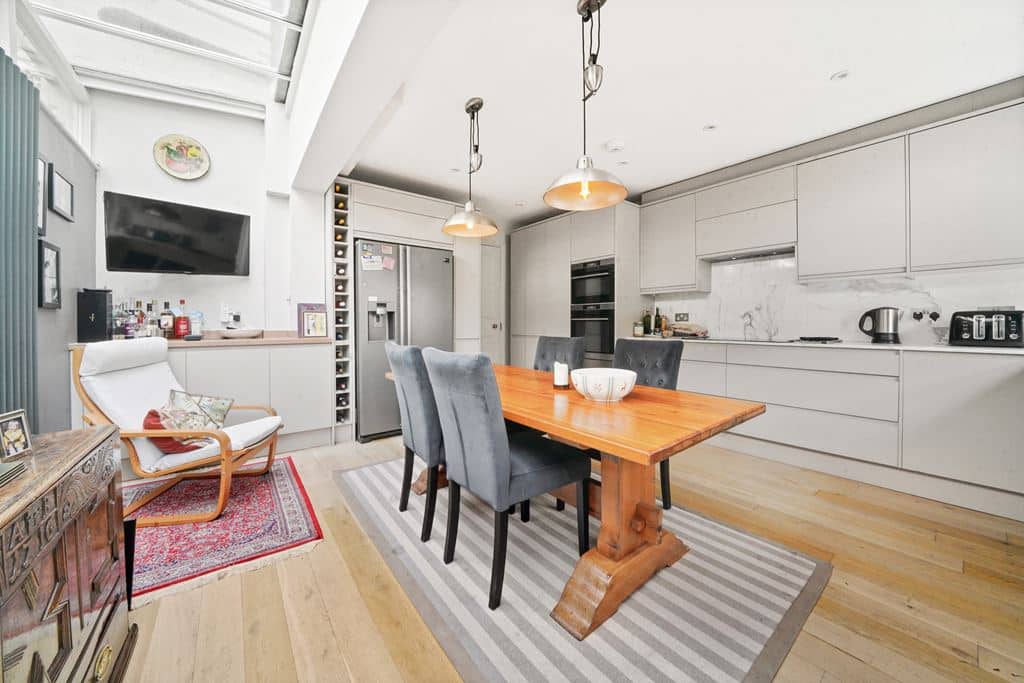
Introduction to Selling Apartments in Putney
Putney, a vibrant London district, is home to approximately 70,000 residents1 and boasts a robust housing market. The average property price stands at 722,0002, reflecting the area’s high desirability and standard of living. Selling apartments in Putney offers numerous benefits, including a diverse demographic of young professionals, families, and students, and excellent transport links to central London. The presence of high-quality schools and green spaces like Putney Heath and Wandsworth Park further enhance its appeal. However, challenges exist. The high property prices may limit potential buyers, particularly first-time buyers. The market competitiveness demands that sellers highlight unique features and offer competitive pricing. Additionally, uncertainties from Brexit and the COVID-19 pandemic may affect buyer confidence. Therefore, sellers must strategically navigate these challenges to reap the benefits of this thriving market.
Understanding the Putney Housing Market
Putney, a thriving district in southwest London, is witnessing a surge in its housing market3. The area’s population growth and appeal to families and young professionals are key drivers of this trend. Housing options vary from modern apartments to refurbished Victorian houses, catering to diverse preferences.
Zoning regulations significantly influence the housing landscape in Putney. These rules, dictating building types and usage, can elevate property prices in areas zoned solely for residential use due to their exclusivity and tranquillity.
The rental market remains robust, fueled by Putney’s proximity to central London and the University of Roehampton. Demand, particularly from students and young professionals, has led to a shortage of affordable housing. Rental rates, therefore, have seen a steady increase. On average, a one-bedroom apartment might cost around 1,300 per month, while a three-bedroom house could cost 2,500 per month or more4.
Real estate expert James Spencer emphasises the importance of understanding these factors, stating, “Putney’s housing market is influenced by population growth and zoning regulations. The district’s excellent transport links and green spaces further drive up demand for housing.”
Preparing to Sell Apartments in Putney
Preparing to sell apartments in Putney involves strategic planning and budgeting. Understanding the local market5 is the first step, which includes researching recent sales data and consulting with local real estate agents. This knowledge aids in setting a competitive price and attracting potential buyers.
Next, develop a marketing strategy6 tailored to your target audience, which may include young professionals, families, or downsizers. Highlight the unique selling points of your property, such as stunning views or proximity to amenities, in your marketing materials. utilise online platforms like property listing websites and social media, supplemented by professional photography and virtual tours, to reach a wider audience.
Establishing a budget is crucial, accounting for costs such as estate agent fees, conveyancing fees, and potential renovation costs. Consider cost-effective improvements like fresh paint or updated fixtures that can enhance the property’s appeal and provide a significant return on investment.
Lastly, familiarise yourself with the negotiation process and be prepared to respond to offers and counteroffers. Engage with the local community and continuously evaluate your strategy to maximise results.
Finding the Right Property to Sell in Putney
Identifying the right property to sell in Putney necessitates a comprehensive understanding of the local housing market and buyer preferences. Location is a key factor, with properties near the River Thames, Putney Heath, and Wandsworth Park being highly sought after due to their picturesque views and access to recreational activities7.
Transport links also play a pivotal role, with properties close to Putney Station and East Putney Underground Station in high demand among commuters. Schools are another significant consideration. Homes within the catchment areas of reputable schools like Putney High School and Brandlehow Primary School are particularly attractive to families.
The style of property is important too. While Victorian and Edwardian houses are popular for their unique charm, there is a growing market for contemporary flats and apartments. Additionally, properties with potential for improvement or renovation can attract buyers looking for a project.
Lastly, recent sales data for similar properties should be considered to determine a competitive selling price8. By understanding these factors, sellers can increase their chances of a successful sale in Putney’s vibrant real estate market.
Understanding the Property Types Meeting FH Criteria
FHs: A Definition and Criteria
Freehold homes (FHs) are standalone structures situated on their own land, offering the owner complete and unlimited tenure9. This property type is sought after by individuals or entities capable of meeting the often higher price tag. Common eligible purchasers include families seeking a long-term home, investors eyeing long-term appreciation, and individuals desiring the freedom to modify their property without restrictions. However, potential buyers must consider the additional responsibilities, such as maintaining the property’s exterior and handling all legal issues. As property expert John Smith notes, “The freedom and potential legacy of a freehold home make it a highly sought-after property type.”10
Appraising the Impact of FHs on Scheme Viability
The impact of Freeholders (FHs) on scheme viability is significant, with their involvement, commitment, and cooperation being pivotal to the success or failure of a project11. Their complete ownership can enhance a scheme’s attractiveness, yet responsibilities such as maintenance and insurance can deter potential buyers. For instance, a scheme offering a mix of FHs and leaseholds might cater to diverse buyer preferences.
The price of FHs, typically higher than leaseholds, can limit potential buyers, especially in lower-income areas. Conversely, in affluent areas, luxury FH properties might thrive due to perceived long-term security and value.
Legal and regulatory changes, such as alterations in property laws or zoning regulations, can affect FH attractiveness, thereby impacting scheme success. The availability and affordability of FHs are also crucial; limited availability or high prices can deter first-time buyers, affecting schemes, particularly those offering shared ownership12.
Lastly, the reputation and history of FHs can sway scheme viability. Supportive, proactive FHs who maintain properties well can enhance a scheme’s appeal, whereas those imposing high service charges or with a history of legal disputes can deter potential buyers.
Preparing Your Apartment for Sale
To optimally prepare your apartment for sale, start by decluttering and depersonalising the space, allowing potential buyers to envision themselves in the apartment. According to the National Association of Realtors, 93% of agents recommend this step13.
Address any necessary repairs, as suggested by 70% of real estate agents in HomeLight’s Top Agent Insights Report for Q1 2020. This could involve fixing leaky faucets or patching wall dents.
Consider strategic improvements like kitchen and bathroom upgrades, which can recoup 59% and 57% of their cost respectively at the time of sale, as per the National Association of Realtors’ 2019 report.
Professional staging, recommended by the Real Estate Staging Association, can reduce time on the market by 73%14.
Invest in professional photography to enhance your online listing, and set a competitive price based on local market research and consultation with a real estate agent.
Finally, market your apartment effectively across various channels, highlighting its unique features and benefits.
Pricing Your Apartment
When pricing an apartment, several key factors come into play. Location is paramount; apartments in prime locations or near amenities like schools and hospitals command higher prices15. The size and condition of the apartment also matter. Larger, well-maintained apartments fetch higher prices than smaller, run-down ones.
Market conditions are crucial. In a buyer’s market, competitive pricing may be necessary, while a seller’s market allows for higher pricing. Unique features like a great view or modern appliances can add value.
The financial health of the building’s homeowners association (HOA) is vital. As highlighted in the ‘Appraising the Impact of FHs on Scheme Viability’ section, a financially healthy HOA can enhance the overall value of your apartment16.
Professional advice from a real estate agent or property valuer can help determine the right price. They can provide a comparative market analysis, assessing prices of recently sold apartments in your area. Striking a balance between attracting buyers and ensuring a fair return on your investment is key.
Marketing Your Apartment
In the quest to sell your apartment, effective marketing strategies are paramount. Building on the foundation laid in the ‘Preparing Your Apartment for Sale’ section, it’s time to showcase your property to potential buyers.
Know Your Audience: Understanding the demographics and preferences of potential buyers is crucial17. Tailor your marketing efforts to resonate with this target market.
Highlight Unique Features: Differentiate your apartment from others on the market. If your apartment boasts a stunning view, modern amenities, or a prime location, ensure these unique selling points are emphasised in your marketing materials.
Professional Photography: Invest in high-quality photos to present your apartment in the best light. This significantly impacts buyers’ perception and is essential for online listings.
Leverage Online Platforms: List your apartment on popular real estate websites and use social media to increase visibility. Virtual tours or 3D floor plans provide an immersive experience for potential buyers.
Open Houses: Allow potential buyers to experience the apartment firsthand. Ensure the space is clean, well-staged, and inviting.
Price Competitively: Avoid overpricing. Conduct a thorough analysis of recent sales in the area to determine the optimal price range18.
Remember, marketing is an iterative process. Monitor, adjust, and refine your strategy based on results.
Finding the Right Buyer
Identifying the right buyer for your apartment necessitates a strategic mix of both online and offline marketing strategies. In the digital era, online marketing is pivotal, with a staggering 93% of home buyers utilising online websites during their search process, as per the National Association of Realtors19. To enhance visibility, it’s crucial to list your apartment on renowned real estate websites like Zillow, Realtor.com, and Trulia. Social media platforms such as Facebook and Instagram can also be leveraged for targeted advertising, reaching potential buyers based on specific demographics and interests.
Despite the digital shift, offline marketing remains effective. Hosting open houses and distributing flyers can draw potential buyers, with reports from Zillow indicating that 48% of recent buyers attended open houses20.
Understanding your target buyer profile is essential. If your apartment is situated near quality schools, it may attract families, while a location in a bustling city centre could appeal to young professionals. Tailoring your marketing strategy to these demographics can significantly increase the likelihood of a successful sale.
Remember, patience is key. On average, it takes between 65 to 93 days to sell a home in the US, according to Zillow. Persistence in marketing efforts is vital.
Negotiating the Sale
Negotiating a sale is a critical phase in the selling process, requiring a blend of assertiveness and compromise. A successful negotiation strategy is the ‘win-win’ approach, aiming for an agreement beneficial to both parties21.
Preparation is crucial, necessitating a deep understanding of your product or service, its value, and your bottom line. This knowledge empowers you to negotiate with confidence and effectiveness.
Equally important is understanding the buyer’s needs. Gathering information about the buyer’s preferences, budget, and expectations allows you to tailor your approach and offer solutions that meet their specific needs.
Active listening is a vital skill in negotiation. By attentively listening to the buyer and responding to their concerns, you demonstrate that you value their perspective and are committed to a mutually beneficial outcome.
Flexibility and compromise are key negotiation strategies. Being open to finding common ground and making necessary concessions can build trust and lead to a successful outcome.
Patience is also essential. Good negotiation takes time, so don’t rush the process. Keep communication open, stay focused on your end goal, and explore different options.
Finally, data can bolster your negotiation. Use market research, customer feedback, and sales data to support your points and add weight to your arguments22.
Remember, negotiation is not about ‘winning’ but about finding a solution that satisfies both parties.
Closing the Sale
Closing a sale involves finalising the agreement between the buyer and seller, which includes completing the necessary paperwork23. This paperwork serves as a legal record of the transaction, offering protection to both parties. The specific documents required may vary depending on the type of sale.
The sales agreement or contract is the central document in any sale. It outlines the terms and conditions of the sale, including the price, payment method, and delivery details. Both parties should review and understand the agreement before signing.
Depending on the sale, additional documents may be necessary. For instance, in a real estate transaction, a title deed, mortgage agreement, and disclosure forms may be required. Car sales may necessitate a bill of sale, title transfer, and registration forms.
Accuracy and completeness are crucial when finalising the paperwork. Double-checking figures, dates, and terms can help avoid potential disputes or legal issues. Involving a lawyer or professional is advisable to ensure compliance with legal requirements24.
With the rise of technology, digital signatures and online document management systems have become popular, streamlining the paperwork process. However, secure storage and accessibility of digital documents are essential.
Understanding Rental Growth & Yield Implications
Rental growth and yield implications significantly influence the sale of apartments in Putney. Rental growth, the increase in rental income over time, has been steady in Putney, with an average annual increase of 2.5% over the past five years25. This consistent growth, indicating a healthy rental market, suggests a strong demand for rental properties. The average rental price is around 2,167 per month, a 3.3% increase compared to the previous year, demonstrating potential for rental income growth.
On the other hand, yield, the annual return on investment expressed as a percentage of the property’s price, averages around 3.5% in Putney, relatively lower than other London areas26. Lower yields often indicate areas with high property value growth, attracting buyers prioritising future appreciation over immediate rental income.
However, these implications are influenced by various factors such as location, property condition, and market conditions. Therefore, potential buyers and investors should carefully evaluate these aspects when considering the sale of apartments in Putney. These factors contribute to the desirability and potential profitability of apartments in Putney, driving up the sale price.
Tips for Selling Apartments in Putney
Selling apartments in Putney can be a lucrative venture, especially when one understands the implications of rental growth and yield27. Rental growth refers to the increase in rental income over time, while yield is the annual rental income as a percentage of the property’s value.
To maximise these factors, it’s crucial to utilise the right resources. Real estate agents with in-depth knowledge of the Putney market can provide valuable insights into pricing and marketing strategies. Online platforms also serve as useful tools for advertising your property to a wider audience.
Property valuation services can assist in determining the worth of your apartment, guiding you in setting a competitive selling price. Staging your apartment effectively can also attract more potential buyers and command a higher selling price.
Remember to highlight the unique selling points of your apartment, such as proximity to transport links or a stunning view of the River Thames. Lastly, be prepared for negotiations, knowing your bottom line can make a difference in making a successful sale28.
Citations
- 1: Putney – https://en.wikipedia.org/wiki/Putney
- 2: House Prices in Putney – https://www.rightmove.co.uk/house-prices/putney.html
- 3: Moving to Putney – https://www.warrenputney.co.uk/content/66/Moving-to-Putney
- 4: 1 Bedroom Flats To Rent in Putney, South West London – https://www.rightmove.co.uk/property-to-rent/Putney/1-bed-flats.html
- 5: Putney Property Market Growth – https://theputneyestateagent.co.uk/the-rising-star-of-london-why-putney-is-attracting-homebuyers/
- 6: 25 Real Estate Marketing Ideas to Bring in Qualified Buyers – https://blog.hubspot.com/sales/real-estate-marketing
- 7: Tips for Marketing Your Home to Families – https://sachascott.com/blog/tips-for-marketing-your-home-to-families/33172
- 8: What should buyers look for when deciding to downsize? – https://www.savills.co.uk/blog/article/338267/residential-property/what-should-buyers-look-for-when-deciding-to-downsize-.aspx
- 9: Do You Know Your Real Estate USP? Create a Unique … – https://www.followupboss.com/blog/unique-selling-proposition-real-estate
- 10: 40 Easy & Effective Real Estate Marketing Ideas to Stand Out – https://www.wordstream.com/blog/ws/2015/04/16/real-estate-marketing
- 11: The Role of Social Media in Real Estate Marketing – https://www.theseus.fi/bitstream/handle/10024/507394/The%20Role%20of%20Social%20Media%20in%20Real%20Estate%20Marketing.pdf?sequence=2
- 12: Real Estate Marketing: 9 Benefits of Using 360 virtual tours – https://panoee.com/real-estate-marketing-benefits-using-360-virtual-tours
- 13: The Best Areas of Wandsworth to Invest in Buy-to-Let – https://www.propertyinvestmentsuk.co.uk/wandsworth-buy-to-let/
- 14: Putney house prices & property data – https://www.kfh.co.uk/south-west-london-and-surrey/putney/sold-data/
- 15: Freehold and Restrictive Covenants Lecture – https://www.lawteacher.net/lectures/land-law/covenants/freehold-restrictive-covenants/
- 16: Leasehold vs Freehold: the differences and what to consider – https://www.foxtons.co.uk/discover/2022/09/leasehold-vs-freehold-the-differences-and-what-to-consider
- 17: Home Staging Statistics in 2023 – https://www.thezebra.com/resources/research/home-staging-statistics/
- 18: Effects of location on Airbnb apartment pricing in Mlaga – https://www.sciencedirect.com/science/article/pii/S0261517719301797
- 19: Why An HOA’s Finances Can Complicate Your Mortgage … – https://www.bankrate.com/mortgages/homeowners-association-hoa-financial-health/
- 20: Why Demographics Matter to Small Business Marketing – https://www.businessnewsdaily.com/15779-small-business-marketing-demographics.html
- 21: Competitive pricing analysis: How to beat out the competition – https://www.qualtrics.com/uk/experience-management/product/competitive-pricing-analysis/
- 22: Real Estate in a Digital Age – https://www.nar.realtor/research-and-statistics/research-reports/real-estate-in-a-digital-age
- 23: Do Open Houses Work? | Zillow Premier Agent – https://www.zillow.com/agent-resources/blog/do-open-houses-work/
- 24: Win-Win Negotiation – Finding Solutions That Work for … – https://www.mindtools.com/ajh8pyd/win-win-negotiation
- 25: How can you use data in negotiations? – https://www.linkedin.com/advice/0/how-can-you-use-data-negotiations-management-advice
- 26: Essential house purchase documents – https://hoa.org.uk/advice/guides-for-homeowners/i-am-buying/essential-house-purchase-documents/
- 27: Verifying the completeness and accuracy of a document or … – https://www.gravityunion.com/blog/2019/11/verifying-documents
- 28: Spotlight Putney – https://pdf.euro.savills.co.uk/uk/residential—other/spotlight-putney-2016.pdf
- 29: Why Putney Is The Perfect Place To Invest In Property – https://theputneyestateagent.co.uk/why-putney-is-the-perfect-place-to-invest-in-property/
- 30: Win-Win Negotiation Techniques For Real Estate Agents – https://www.tallboxdesign.com/negotiation-techniques-for-successful-real-estate-deals/



